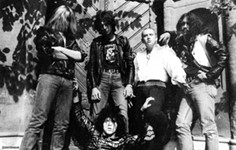Captive Audience
How a homegrown kidnapping thriller emerged as the most popular film in Venezuela – and angered the Chavez administration in the process
By Michael King, Fri., Oct. 21, 2005

Ask Venezuelan filmmaker Jonathan Jakubowicz about his new film, Secuestro Express, and he quickly drifts into a critique of the government of President Hugo Chavez, which plays only a background but crucial role in the movie. "Ninety percent of what he [Chavez] says is right," declares Jakubowicz, "and 90 percent of what he does is wrong."
The specific question had been what Jakubowicz believes has made Secuestro the most popular Venezuelan film in history, and the writer-director responds that, in touching upon and growing out of the last decade of Venezuelan history, "the movie speaks [to Venezuelans] about what's going on in the society," and it's perhaps inevitably but awkwardly become embroiled in national politics. Since its release earlier this year, the film has become not only the biggest grossing national film, but has surpassed The Passion of the Christ and as of last week was behind only Shrek 2 in total sales, to an audience accustomed to attending primarily Hollywood films.
Secuestro Express opened in selected U.S. cities in August to mixed but strongly emotional reviews. But the film has deep local roots, in that it was in part a project spun from the Austin film family of director Robert Rodriguez and his wife, producer Elizabeth Avellán. Avellán is originally from Venezuela, and she and Jakubowicz came to meet through mutual family connections – "Caracas is just like that," Avellan says, "everybody knows everybody" – and the young director once studied at UT and interned on the Rodriguez production of Once Upon a Time in Mexico. "Her father installed the Internet in my family's home," Jakubowicz recalled with a laugh, "and he told me his son-in-law was Robert Rodriguez. I didn't believe him." Eventually, Jakubowicz was persuaded, and when at 17 he was hosting his own radio interview show in Caracas, Avellán came to town and met him for an on-air talk about film.
"I found him so interesting and intelligent immediately," she recalls, "this young man who already knew so much about film. So, we stayed in touch, and he begin sending me things he was doing, and I'd give him a reaction. He kept getting better and better."
With the support of his family, Jakubowicz directed a short fictional film called "Distance" in 2002, and followed it with the prize-winning Ships of Hope, a documentary recounting the exodus of Jewish refugees from Nazism to Venezuela (a journey that included members of his own family). Later, he was considering subjects for another short, and one was his own experience of the increasingly common South American phenomenon of "express kidnapping," in which a person is snatched off the streets for a few hours, held for a family ransom of a few thousand dollars – not enough to interest the police – and then released or, sometimes, killed. In the director's case, a few years ago he and friends were grabbed and then abandoned after being robbed of their money, ATM cards, car, and clothes. It had become a common-enough urban Venezuelan incident that Jakubowicz didn't think it worthy of recording, but Sandra Condito (also a Rodriguez producer) convinced him that it was the perfect subject for his first narrative film – which became a feature in the course of the project.
The result is a gritty, slice-of-life thriller that follows a kidnapping from the first predawn hours through the brutality, betrayals, and incidental official and unofficial corruption of the following day. Mia Maestro – most familiar to American audiences from her recurring role on TV's Alias – delivers an emotionally wrenching performance as the female victim, Carla, and Jakubowicz also elicited astonishing naturalist portrayals of the three kidnappers from first-time actors Carlos Julio Molina, Pedro Perez, and Carlos Madera – Venezuelan rap stars who persuaded the director to allow them to audition when he approached them for soundtrack music.
The film was shot on location in Caracas – during a general strike that both heightened the atmosphere of cultural paranoia and made it easier to meet a production schedule on the normally gridlocked city freeways – and Avellán provided post-production help in Austin, Rodriguez offered notes, and the film was edited at the Spicewood home of producer Condito and her husband, editor Ethan Maniquis.
Jakubowicz doesn't consider himself a "political" filmmaker, although in its opening and closing moments, the film makes brief but explicit reference to the extreme tensions now current in Venezuelan society. "And [the crisis] didn't begin with Chavez," says Jakubowicz, although he describes the new government as pretending to attack the old oligarchy but putting in its place a "new elite" of its own. "The gap between the extremely wealthy and the rest of the society only continues to grow. There is a crisis on every level, and the society is being split in two."
Some of this very specific, local implication will be lost on U.S. filmgoers, but it clearly has not been lost on the Chavez government. Instead of embracing the work of this homegrown filmmaker, officials have mostly excoriated Secuestro Express as an attack on life under Chavez, even threatening the filmmaker with imprisonment. Despite the film's overwhelming popularity, the government film commission has declined to submit it for Academy Award consideration (a petition campaign to overturn the decision is posted at the film's Web site), and most recently Vice President Jose Vicente Rangel reportedly denounced it as a "miserable film, a falsification of the truth with no artistic value."
Officially, what happens next remains to be seen, but the filmmakers are hoping for an international audience that will find its own emotional echo in a fiercely national cinematic tale. "We are at a point of no return in the society," concludes Jakubowicz bluntly. "We must communicate. We must begin a dialogue." Extreme and bleak as it undoubtedly is, Secuestro Express is clearly Jonathan Jakubowicz's personal attempt to initiate that process. ![]()
Secuestro Express received its Austin premiere this week, first in a benefit showing for the Austin Film Society on Wednesday, and currently in a limited run at the Metropolitan. For a review and show times, see Film Listings.










